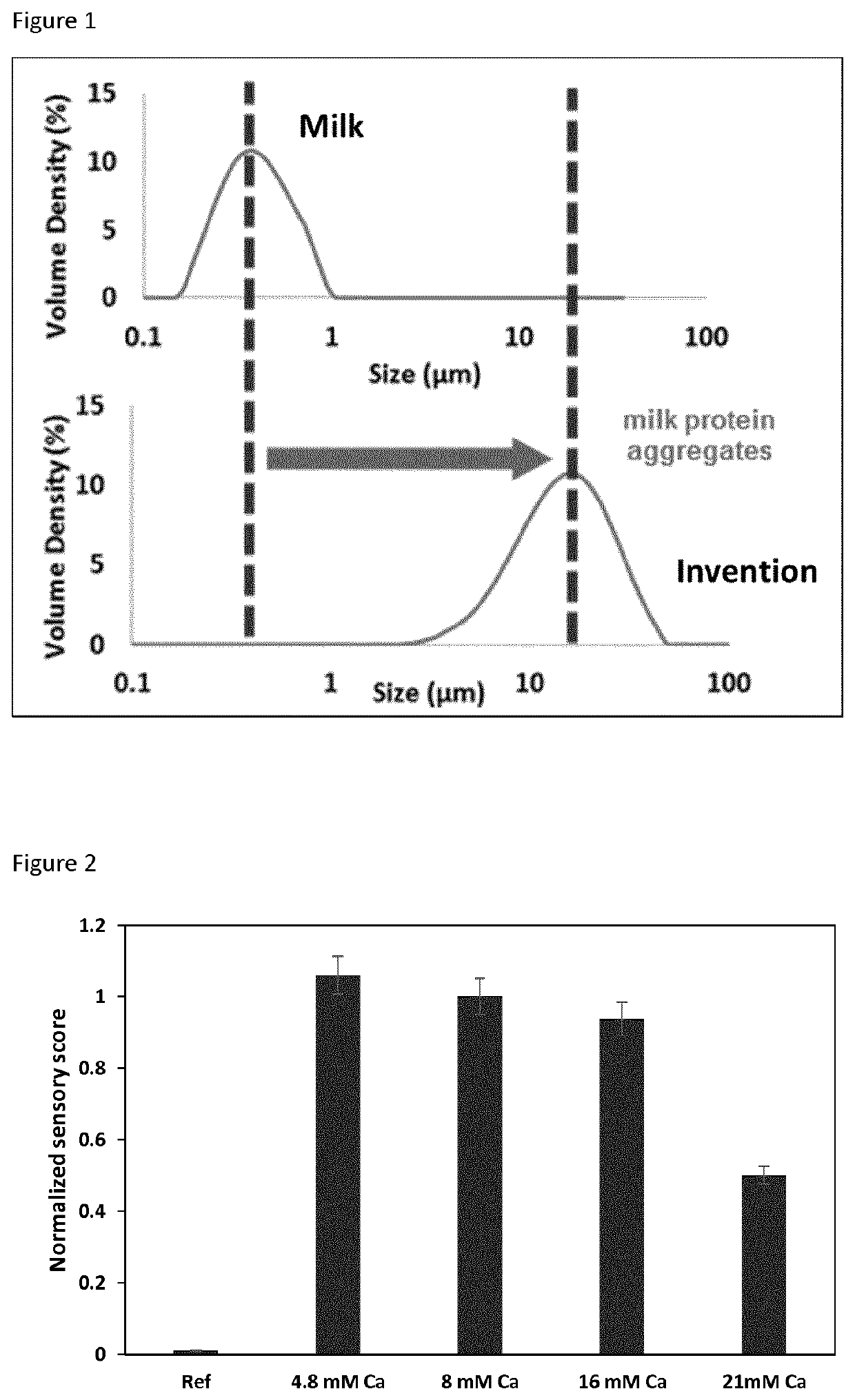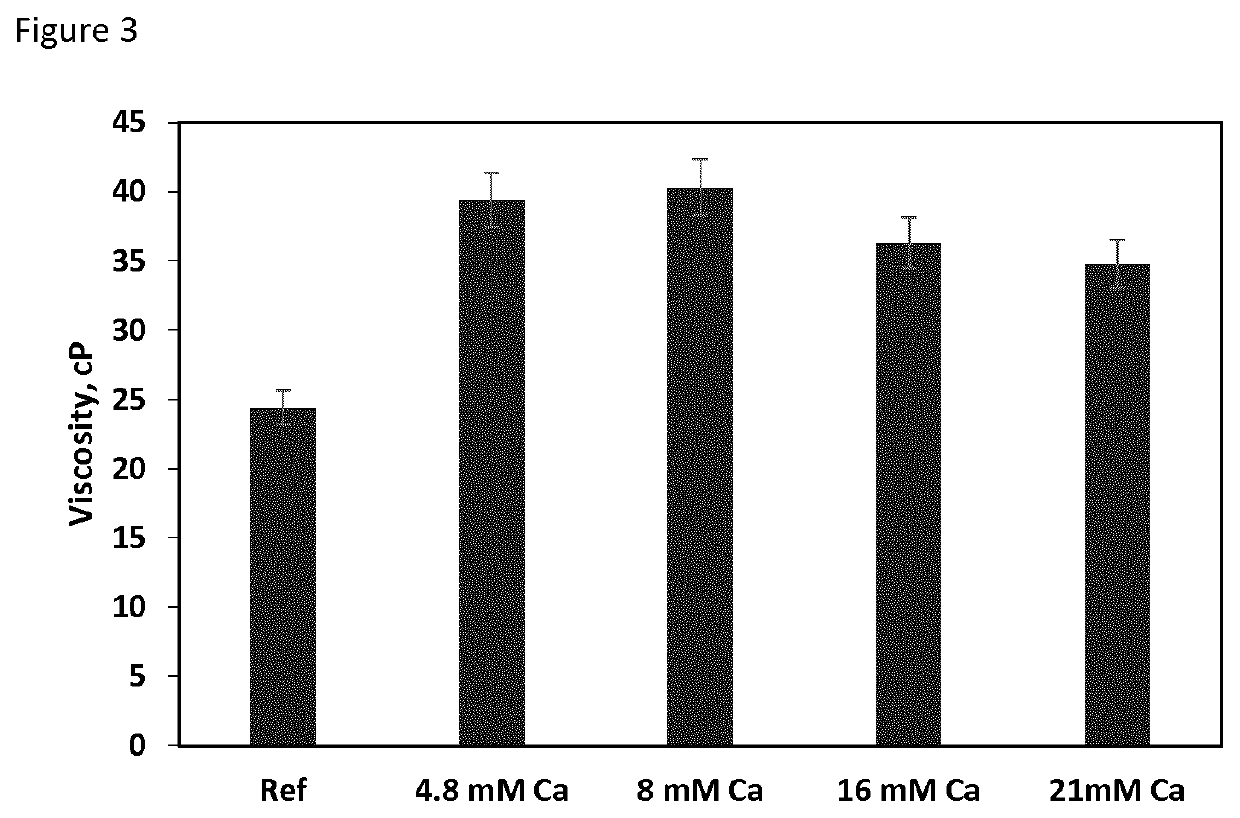Beverage product with free divalent cations protein aggregation and a method producing thereof
a technology of free divalent cations and beverage products, which is applied in the field of shelf stable ready-to-drink beverage products, can solve problems such as serum separation and/or sedimentation, and achieve the effect of improving texture and mouthfeel
- Summary
- Abstract
- Description
- Claims
- Application Information
AI Technical Summary
Benefits of technology
Problems solved by technology
Method used
Image
Examples
example 1
[0051]Preparation of Beverages
[0052]The RTD beverages are made by the following process:[0053]Hydration (e.g., wetting) of cocoa powder in water for 45 minutes at 90° C. to form the cocoa slurry.[0054]High acyl gellan gum and / or guar gum was dry blended with sucrose and then were added under high agitation to a separate tank containing fluid milk.[0055]Addition under agitation of the cocoa slurry to the fluid milk tank containing hydrocolloids[0056]Addition under agitation of the rest of ingredients such as sweetener, other flavors, and source of divalent cations[0057]Homogenization at 135 / 35 bars at 70° C.[0058]Subjection of the beverage to ultra-high temperature (UHT) heat treatment at about 142° C. for about 11 seconds[0059]Cooling below 25° C. under aseptic conditions[0060]Aseptic filling of the RTD beverage into a suitable aseptic container, e.g. PET bottles, Tetra Pak®, jars, jugs or pouches.
example 2
[0061]The RTD beverage was prepared as in Example 1 process, using 44 kg of skim milk, 3.5 kg of milk cream, 2.5 kg of whey milk powders, 30 g of high acyl gellan gum, 90 g of guar gum, 5 kg sugar, 1 kg of cocoa, 150 g of calcium lactate pentahydrate and water necessary to reach 100 kg of the final beverage.
[0062]Particle size distribution determined by using a laser light scattering Mastersizer 3000 MA (Malvern Instrument) equipped with Hydro 2000G dispersion unit is shown in FIG. 1 in comparison between milk produced without added calcium source and invention produced with calcium. The FIG. 1 shows protein aggregation in the invention produced with calcium.
[0063]Beverage physico-chemical properties were evaluated and sensory characteristics were judged by trained sensory panelists. It was found that the RTD beverage significantly improved texture / mouthfeel (improvement is significant if normalized sensory score is equal or above 0.5) having normalized sensory texture attribute ˜ o...
example 3
[0064]The RTD beverage with controlled protein aggregation was prepared as in Example 2, but using 250 g of calcium lactate pentahydrate.
[0065]Beverage physico-chemical properties were evaluated and sensory characteristics were judged by trained sensory panelists. It was found that the RTD beverage significantly improved texture / mouthfeel having normalized sensory texture attribute of 1 (FIG. 2). The invention beverage also had homogeneous visual appearance.
PUM
 Login to View More
Login to View More Abstract
Description
Claims
Application Information
 Login to View More
Login to View More - R&D
- Intellectual Property
- Life Sciences
- Materials
- Tech Scout
- Unparalleled Data Quality
- Higher Quality Content
- 60% Fewer Hallucinations
Browse by: Latest US Patents, China's latest patents, Technical Efficacy Thesaurus, Application Domain, Technology Topic, Popular Technical Reports.
© 2025 PatSnap. All rights reserved.Legal|Privacy policy|Modern Slavery Act Transparency Statement|Sitemap|About US| Contact US: help@patsnap.com


